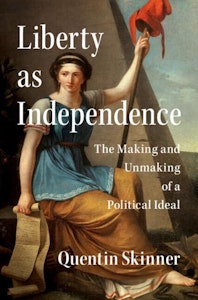This article is taken from the April 2025 issue of The Critic. To get the full magazine why not subscribe? Right now we’re offering five issues for just £10.
It almost feels like an impertinence to review Quentin Skinner’s latest book. The doyen of what is now known as the Cambridge School of the history of political thought, he is one of the few academics to become a legend in their own time. Not content to rest on his laurels, Skinner has now published Liberty as Independence, a book of fantastic depth and breadth, full of good learning and effortless erudition, which is sure to become an instant classic.
Skinner’s thesis, which is relatively straightforward by the standards of the discipline, is that during the late eighteenth century, there was a major shift in the anglophone understanding of liberty, away from “liberty as independence”, meaning freedom from arbitrary power and the ability to act according to one’s autonomous will, and toward a hegemonic ideology of liberty as the lack of restraint, or liberty as non-interference.
The American, but especially the French Revolution hastened the decline of liberty as independence
The argument is backed up by an impressive range of reading, much of it done online during the lockdown, to the shame of lesser mortals who frittered their time away watching television series of dubious merit. His book begins with a close reading of William of Orange’s declaration of 1688 justifying his invasion of England, and ends with John Austin’s 1832 treatise The Province of Jurisprudence Determined.
In between, Skinner draws on texts as diverse as Henry Fielding’s Tom Jones (for his critique of the maladministration of justice by justices of the peace) to the natural law jurisprudence of the German jurist Johann Heineccius, to any number of sermons by obscure divines, not forgetting of course the big names such as Hobbes, Locke and Milton.
As Skinner shows, the concept of liberty as independence has a long pedigree, going back to the canonical Roman writers — Cicero, Sallust, Livy, Tacitus — whose works were available in English by the sixteenth century and carried the Roman analytical tradition of liberty into English thought, being championed by republican writers such as Milton and Marchamont Nedham under the Commonwealth.

But even un-republican English thinkers adhered to the same vision of liberty, through a parallel legal transmission, via the influence of Justinian’s Digest as incorporated by Bracton.
The Whig Ascendancy seemed to solidify the hold of liberty as independence on English thought, as pro-government propagandists churned out acres of text congratulating Britons for being “the freest and the happiest of people” thanks to “our happy constitution” which enabled all to seek fulfilment and success.
But it all began to go wrong within a few decades, as the cheerful vision came under sustained attack by mocking writers on a range of subjects, ranging from slavery to women’s rights to, perhaps surprising to modern readers, the advent of the permanent national debt, and with it the spectre of despotism. The Thirteen Colonies’ break with Britain, Skinner does not fail to remind us, began with a fiscal dispute, and ended with the general rejection of the Hanoverians’ alleged tyranny.
From there on, it was all downhill for liberty as independence, whose proponents increasingly had to contend with the new vision of liberty as nothing more than the lack of restraint. The American, but especially the French Revolution hastened the decline of liberty as independence, with which the two revolutionary outbursts had become associated.
Liberty as the lack of restraint became the new orthodoxy, as liberty as independence became confined to the radical fringe of the political scene. In the words of Skinner, “the liberal view of liberty [as lack of restraint] became so widely accepted that the question of how to think about the relationship between freedom and government soon almost ceased to be discussed”.
What does all of this mean for us? One of the many strengths of the book is that, while Skinner’s argument has obvious contemporary political implications, he is careful not to allow them to intrude on his argument until the last few pages, where he offers a few tentative observations. Unsurprisingly, he sees many virtues in the older tradition, which to his mind leads to a “morally preferable account of the relationship between government and the governed” for it requires democratic representative government to function, whereas the liberty as non-interference account does not require democracy at all.
In a sign of the times, he also has to contend with his colleagues who criticise democracy as independence for being “deeply associated throughout its history with misogynist, militaristic and hierarchical prejudices”. Those who are not in the thick of disciplinary neuroses can find much to learn in this difficult, but ultimately rewarding work.







